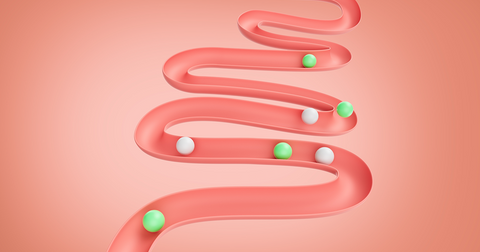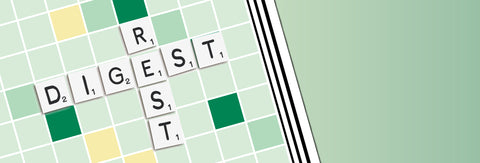Vous êtes-vous déjà demandé ce qui arrive aux probiotiques dans le corps après les avoir pris ? Ou comment ils soutiennent réellement votre santé ? Les probiotiques sont des bactéries vivantes bénéfiques (et d’autres micro-organismes) qui procurent des bienfaits pour la santé. Ils sont surtout connus pour leurs effets positifs sur le système gastro-intestinal, en particulier sur l’intestin. Cependant, les probiotiques ont été étudiés de manière approfondie et présentent de nombreux avantages au-delà de la santé digestive. Des études ont montré que les probiotiques peuvent influencer la réponse inflammatoire du corps, soutenir la connexion intestin-cerveau (qui a un impact sur l’humeur et la fonction immunitaire) et bien plus encore.
Comment les probiotiques agissent-ils dans le corps ?
Après ingestion, les suppléments probiotiques passent par l'estomac et se dirigent vers les intestins. L'environnement de l'estomac est assez acide, ce qui peut constituer un défi pour la survie de ces bactéries bénéfiques. Cependant, les probiotiques de haute qualité sont conçus pour résister à l'acide gastrique et atteindre les intestins vivants. Les avantages spécifiques qu'ils procurent dépendent de divers facteurs, tels que la souche et l'espèce de bactéries et la zone du tractus gastro-intestinal qu'ils colonisent. Voici un aperçu plus détaillé de certaines de leurs fonctions :
- Inhiber les bactéries pathogènes : Les probiotiques peuvent inhiber la croissance des bactéries nocives et d’autres micro-organismes. En concurrençant les nutriments et les sites de fixation dans l’intestin, ils contribuent à maintenir un équilibre sain du microbiote .
- Production d’acides gras à chaîne courte : Certains probiotiques produisent des acides gras à chaîne courte (AGCC) comme le butyrate, qui jouent un rôle essentiel dans la santé intestinale. Les AGCC aident à nourrir les cellules qui tapissent le côlon, aident à maintenir la barrière intestinale et ont des propriétés anti-inflammatoires.
- Soutien à la synthèse des vitamines : les probiotiques peuvent aider à la synthèse de vitamines essentielles, notamment certaines vitamines B et la vitamine K, qui sont cruciales pour diverses fonctions corporelles.
Au-delà de la santé intestinale : des avantages supplémentaires
Les probiotiques ne sont pas seulement bénéfiques pour la santé intestinale. Il a été démontré qu'ils influencent :
- La réponse inflammatoire du corps : les probiotiques peuvent moduler le système immunitaire, réduisant potentiellement l’inflammation et soutenant la fonction immunitaire.
- Le lien intestin-cerveau : De plus en plus de preuves suggèrent que l'intestin et le cerveau sont étroitement liés. Les probiotiques pourraient jouer un rôle dans l'influence de l'humeur et de la santé mentale en agissant sur cet axe intestin-cerveau.
La synergie des probiotiques et de l’alimentation
Les probiotiques ne fonctionnent pas seuls ; ils agissent en synergie avec les aliments que nous mangeons et les vitamines et minéraux que nous consommons. Ils se nourrissent de prébiotiques, des fibres non digestibles présentes dans des aliments comme les bananes, les oignons, l'ail et les céréales complètes. Les prébiotiques servent de nourriture aux probiotiques, les aidant à se développer et à se multiplier. De plus, certaines vitamines et minéraux pris sous forme de suppléments peuvent renforcer les bienfaits des probiotiques. Explorons quelques nutriments clés et leurs rôles dans l'organisme :
Vitamine B12 - La vitamine B12 est essentielle à la formation des globules rouges, à la synthèse de l'ADN et au développement et au fonctionnement des cellules cérébrales et nerveuses. La vitamine B12 est présente dans les produits d'origine animale et dans la levure alimentaire. Lorsque nous la consommons, l'acide gastrique aide à la séparer de la protéine à laquelle elle est attachée. Elle se combine ensuite avec le facteur intrinsèque, une protéine fabriquée dans l'estomac et est absorbée dans l'intestin grêle.
Vitamine C - La vitamine C est un puissant antioxydant et un cofacteur dans la formation du collagène, le métabolisme des catécholamines et l'absorption du fer alimentaire. Les humains ne peuvent pas fabriquer de vitamine C et doivent l'obtenir par l'alimentation, dont d'excellentes sources sont les agrumes, les baies, les tomates, les pommes de terre et les légumes à feuilles vertes. La vitamine C est absorbée dans la partie inférieure de l'intestin grêle.
Vitamine D - La vitamine D facilite l'absorption du calcium dans l'intestin, en maintenant des niveaux adéquats de calcium et de phosphate sériques pour une minéralisation osseuse normale et en prévenant les crampes et les spasmes musculaires. Elle est essentielle à la croissance et au remodelage des os et à la santé globale du squelette. Elle est également bien connue pour son soutien à la fonction immunitaire. La vitamine D est absorbée par l'intestin grêle.
Zinc – Le zinc joue un rôle essentiel dans la croissance et le développement, la fonction immunitaire, la neurotransmission, la vision, la reproduction et le transport intestinal des ions. Présent en abondance dans la viande, les œufs et les fruits de mer, le zinc des céréales complètes et des légumineuses est moins biodisponible en raison de composants végétaux comme les phytates. Le zinc est absorbé dans tout l’intestin grêle.
Les probiotiques sont un élément fascinant et essentiel de notre santé globale, fonctionnant en tandem avec les aliments que nous mangeons et les nutriments que nous absorbons. Qu'il s'agisse de favoriser la santé intestinale et la fonction immunitaire ou de soutenir la synthèse des vitamines et l'absorption des nutriments, l'interaction entre les probiotiques et les nutriments souligne l'importance d'une alimentation équilibrée et d'un microbiome sain. Jamieson propose une vaste gamme d'options probiotiques dans différents formats.
Découvrez le dernier lancement de Jamieson : un probiotique avancé qui combine les bienfaits de souches probiotiques ciblées avec des micronutriments clés comme la vitamine C, la vitamine D, la vitamine B12 et le zinc pour soutenir la santé immunitaire. Lien vers le produit.
Références:
1. Instituts nationaux de la santé. Probiotiques. Consulté le 1er août 2024 à l'adresse : https://ods.od.nih.gov/factsheets/Probiotics-HealthProfessional/
- Kerry, G. et al. (2018). « Bienfaits des probiotiques pour la santé humaine : une revue ». Journal of Food and Drug Analysis 26.3 (2018) : 927–939
- Ríos-Covián, D., et al. (2016). Acides gras à chaîne courte intestinale et leur lien avec l'alimentation et la santé humaine. Frontiers in Microbiology, 7, 185 DOI=10.3389/fmicb.2016.0018
- Rowland I, et al. Fonctions du microbiote intestinal : métabolisme des nutriments et autres composants alimentaires. Eur J Nutr. 2018 févr.;57(1):1-24. doi: 10.1007/s00394-017-1445-8. Epub 2017 avr. 9. PMID: 28393285; PMCID: PMC5847071.
- Cristofori F, Dargenio VN, Dargenio C, Miniello VL, Barone M, Francavilla R. Effets anti-inflammatoires et immunomodulateurs des probiotiques sur l'inflammation intestinale : une porte vers le corps. Front Immunol. 26 février 2021 ; 12 : 578386. doi : 10.3389/fimmu.2021.578386. PMID : 33717063 ; PMCID : PMC7953067.
- Montiel-Castro, A., González-Cervantes, R., Bravo-Ruiseco, G., & Pacheco-López, G. (2013). L'axe microbiote-intestin-cerveau : corrélats neurocomportementaux, santé et socialité. Frontiers in Integrative Neuroscience , 7 , 70–86.
- den Besten, G., et al. (2013). Le rôle des acides gras à chaîne courte dans l'interaction entre l'alimentation, le microbiote intestinal et le métabolisme énergétique de l'hôte. Journal of lipid research, 54(9), 2325–2340. doi:10.1194/jlr.R036012
- Instituts nationaux de la santé. Vitamine B12. Consulté le 1er août 2024 à l'adresse suivante : https://ods.od.nih.gov/factsheets/VitaminB12-Consumer/#:~:text=Le%20corps%20absorbe%20la%20vitamine%20B12,le%20corps%20absorbe%20les%20ensemble
- Abdullah M, Jamil RT, Attia FN. Vitamine C (acide ascorbique) [Mis à jour le 1er mai 2023]. Dans : StatPearls [Internet]. Treasure Island (FL) : StatPearls Publishing ; 2024 janv.-. Disponible sur : https://www.ncbi.nlm.nih.gov/books/NBK499877/
- National Institutes of Health. Vitamine D. Consulté le 1er août 2024 à l'adresse suivante : https://ods.od.nih.gov/factsheets/VitaminD-HealthProfessional/
- Maares M, Haase H. Guide de l'absorption du zinc chez l'homme : aperçu général et avancées récentes des modèles intestinaux in vitro. Nutrients. 13 mars 2020 ;12(3) :762. doi : 10.3390/nu12030762. PMID : 32183116 ; PMCID : PMC7146416.




